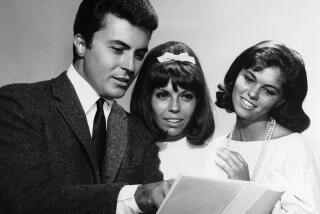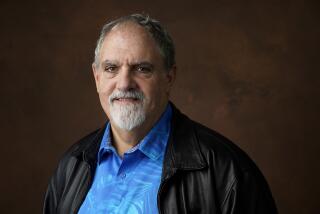Will Vinton, award-winning animator and pioneer of Claymation, dies at 70
For Will Vinton, everything started with a lump of clay.
During the 1960s, he was an architecture student at UC Berkeley when he became fascinated by the whimsical, organic work of Spanish architect Antoni Gaudi. He needed to use the clay to imitate Gaudi’s sensuous shapes.
His friends, often after a few beers, would play with the clay that was always lying around Vinton’s house. And Vinton, who dabbled in filmmaking, would shoot movies of the clay’s evolving form. Those were the first seeds of what would eventually become his signature technique, known as Claymation.
“Sometimes we made some pretty obscene things out of it,” Vinton told The Times in 1987, “but no matter what we did, the clay always came to life.”
Vinton, the award-winning animator known for his groundbreaking work with Claymation, died Thursday in Portland, Ore., after a 12-year battle with multiple myeloma. He was 70.
“He saw the world as an imaginative playground full of fantasy, joy, and character,” his children said in a Facebook post. “He created stories and characters filled with laughter, music, and powerful lessons that are globally beloved.”
They added: “He brightened any room with his signature mustache, and he continued to make jokes and laugh until the very end. His work will live on in animation history and will continue to inspire creative thinkers and makers.”
Colleagues remembered Vinton as a kind, sweet and creative person.
“He put [Portland] on the map as far as stop-motion in America,” Rose Bond, a professor at Pacific Northwest College of Art in Portland, told the Associated Press.
“I’ll always have great memories of Will Vinton’s films,” said director Peyton Reed on Twitter. “Hugely inspiring.”
Over his decades-long career, he won an Oscar as well as a number of Emmy Awards.
Among his best-known works were the anthropomorphic California Raisins, who wore colorful sneakers and white gloves as they danced along to a soulful voice crooning about being raised in the California sunshine. They won the hearts of television viewers in the 1980s.
The commercial not only helped boost raisin sales, transforming their mid-’80s image as something only nerdy people ate into a more hip food, but launched a franchise of California Raisins products including figures, shirts and bedsheets.
A McMinnville, Ore., native, Vinton left his childhood home in the 1960s for UC Berkeley, where he studied film, art and architecture and eventually started thinking about clay animation.
It was while Vinton was at Berkeley that he met sculptor and then-art student Bob Gardiner.
Moving to Portland after his studies, Vinton eventually persuaded Gardiner to join him in the 1970s. The pair began collaborating, taking to Vinton’s basement to work on projects and refining their Claymation technique.
The two experimented with their clay animation technique for five years before producing the short film “Closed Mondays.” The film won the Academy Award for animated short in 1975.
Though Vinton was not the first person to animate clay, his film “demonstrated a new and highly sophisticated technique of clay animation incorporating lip-sync dialogue and subtle nuances of facial expression,” wrote Charles Solomon for The Times in 1980.
“Even within the world of animation, where everything requires horrendous amounts of work, stop-motion film making, especially Vinton’s staggeringly complex style of stop-motion, is regarded as a thing apart, requiring special talent — or madness.”
At the time, Vinton scoffed at the suggestion that such work could be considered as monotonous.
“I’m always being asked about that, and I don’t think the process is tedious at all … I think clay is the perfect substance for animation,” Vinton told The Times in 1980. “The possibilities of the medium are virtually limitless.”
He received subsequent Oscar nominations for the short films “Rip Van Winkle” (1978), “The Creation” (1981) and “The Great Cognito” (1982), as well as one in the visual effects category for “Return of Oz” in 1985.
Vinton helped establish Portland as a creative hub. His Will Vinton Studios, which he founded in the city in the late 1970s, grew to be a $25-million company with 450 full-time employees.
In addition to the California Raisins, the studio animated the Noid commercials for Domino’s Pizza, a sequence for Michael Jackson’s “Moonwalker”; the Emmy Award-winning TV series “The PJs,” which featured the voices of Eddie Murphy and Loretta Devine; and more, including Emmy-winning Claymation specials and a sequence for the TV show “Moonlighting.”
Although they weren’t Claymation, Vinton also created the talking M&Ms seen in the colorful chocolate candies’ television spots.
Vinton eventually departed Will Vinton Studios after some financial struggles that had led to Nike co-founder Philip H. Knight becoming majority shareholder in the early 2000s. It was out of Will Vinton Studios’ ashes that the stop-motion animation studio Laika was born.
The animator’s legacy also includes co-founding the Portland Creative Conference, an annual three-day event that brings together various creatives and industry types from the world of film, television, interactive media and design.
The conference’s “goal is to give creativity its day in the sun,” Vinton told The Times in 1995.
Vinton also made history in feature films.
His 1985 feature-length directorial debut, “The Adventures of Mark Twain by Huck Finn,” was the first clay animation feature ever.
“Claymation is a performance sculpted with the fingers,” Vinton told The Times in 1985. “The animator sits in front of the camera and performs this blog of clay, much the way an actor acts, trying to communicate the character’s thoughts and feelings.”
Vinton is survived by his wife, Gillian; sons Billy Vinton and Jesse Vinton; daughter Alexandra Vinton; and sisters Mary Vinton Folberg and Alice Vinton.
Twitter: @tracycbrown
More to Read
The complete guide to home viewing
Get Screen Gab for everything about the TV shows and streaming movies everyone’s talking about.
You may occasionally receive promotional content from the Los Angeles Times.







